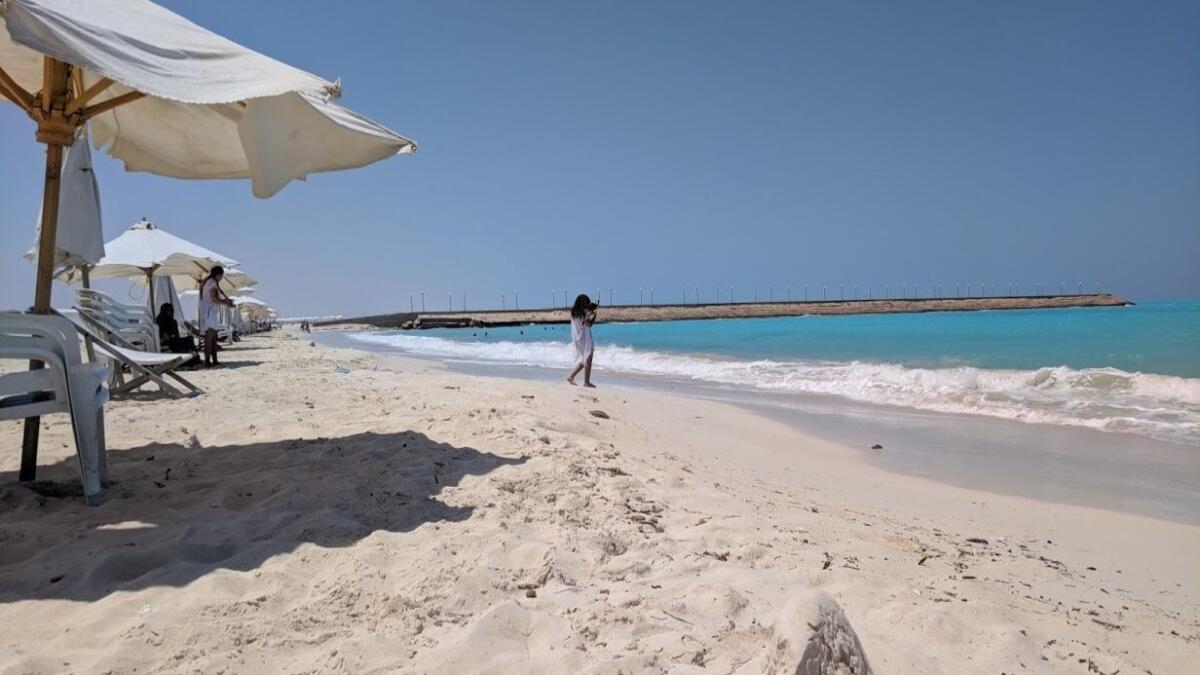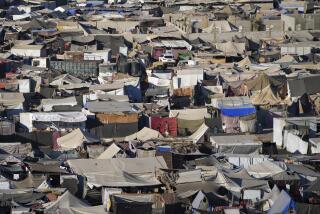Egypt’s summertime escape: White sand beaches and designer cocktails, but no room for the public

Kiki’s Beach Bar offers cool breezes and $14 designer cocktails. But good luck getting in — unless you’re famous, or, better yet, know someone who works the door.
But exclusivity, of course, is a draw for Cairo’s junior beau monde, which on Thursday afternoons this time of year decamps north to the clear, cool waters of Sahel (“The Coast”), leaving the donkey carts and shisha bars of the capital far behind. Around midnight, Kiki’s and other elite North Coast drinking establishments such as Lemon Tree and Sachi by the Sea start filling with men in linen shirts and women in glittering halter tops and eyelash extensions.
The North Coast, which refers to the Mediterranean shoreline from Alexandria to the Libyan border, has seen a proliferation of upper-crust watering holes with the rapid development of ever-newer, posher resorts, even as ordinary citizens struggle to cope with the soaring cost of water, gas and electricity. If economic shocks such as the “Arab Spring” or a 2013 military coup have plunged almost a third of this country’s 95 million people into poverty, you wouldn’t know it in Sahel, where fashionable nightspots are packed with recent graduates of Western universities decked out in Ibiza- and Miami Beach-inspired ensembles.
Across Cairo and up and down the North Coast highway, massive billboards for new upscale developments such as Fouka Bay and La Vista show off spotless chalets on empty white sands against the trademark turquoise sea of this prime 300-mile stretch of the southernmost shore of the Mediterranean.
In reality, little of the shoreline has been left untouched.
“I don’t think there is a single stretch of undisturbed coastline,” said David Sims, a Cairo-based economist and urban planner who describes the North Coast as “the hottest real estate market in Egypt,” thanks to the remarkable pace of high-density construction, which has left almost no public beaches or open spaces.
On summer weekend afternoons, inside Marina, the oldest and largest — but no longer the fanciest — resort in Sahel, young women in shorts hand out party fliers to passing drivers. Of course, those functions are open only to those who can afford the door charge. Entry alone is $30 to upward of $50 at the “decent” clubs, especially if there’s live music or a known deejay, says Mohamed Rashed, a Cairo-based writer at Scoop Empire, an “urban destination” website. That’s more than the average Egyptian earns in a week. Some clubs require advance reservations, or screen prospective patrons via Facebook or other such Darwinian methods.
“In Egypt, you have two types of rich people,” Rashed said. “There are rich people who just have money, who went to good, private universities — and then there are the super rich.” On Fridays, members of the latter category begin arriving several hours before sunset at Rituals, a nirvana-themed affair where you can nibble sushi while lounging beneath a hemp umbrella on a plush white terry cloth-covered bed just a few feet from the waves.

For decades, tradition has dictated that anyone who could afford to flee the heat and traffic of Cairo head for the Mediterranean shores in the summer. Under the Egyptian monarchy, the entire government relocated to Alexandria during July and August.
But it wasn’t until 1992 that Marina, the original North Coast luxury mega-resort, arose on a seven-mile stretch of state-owned land that once housed an ancient Greco-Roman trading port. With thousands of dwellings, the resort featured a golf course, man-made lagoons and even a “minister’s row” on a private island, where Hosni Mubarak-era heavyweights still summer to this day.
But most of the Pharaonic set has long since left Marina — now considered nearly middle class — for newer, more prestigious addresses farther west. “It’s fashion,” shrugged Manal Hussein, a former deputy minister of finance who is now chairwoman of Orascom Hotels and Development, one of Egypt’s largest firms.
Soon, she may also trade in her family’s 15-year-old, six-bedroom Marina mansion, with its pool, jacuzzi and servants’ quarters, despite the many happy summer memories there. Attending the Sahel weddings and luncheons that take place regularly in her milieu these days involves a 40-minute drive westward to more rarified real estate, Hussein explained.
Come September, though, beauty parlors, bars, even grocery stores will all be padlocked as the summer season draws to an end. The barbacks and nannies and other workers will mostly return to Cairo along with their bosses, leaving the North Coast largely deserted.
This was not what the government originally had in mind, explains Sims in his 2015 book “Egypt’s Desert Dreams: Development or Disaster?” With the opening of Egypt’s economy in the late ’70s, he says, Cairo hatched an ambitious plan to tap the region’s potential. The coastline was to become a magnet for international tourists, with industry and agriculture farther inland creating jobs for working-class Egyptians. But developers and officials quickly discovered that there was a much quicker and easier profit to be made building summer homes for the wealthy.
A local business magazine lamented in 1998 the squandering of coast that could have rivaled “the French Riviera, Spain’s Costa del Sol and the Turkish Antalya.”

Even today there is little permanent employment and almost no foreign tourism on the North Coast, despite marketing claims by government officials and real estate brochures that tout Sahel’s “world-class international resorts” where compounds have names like Verona and Valencia and flourishes of Italian- and Spanish-inspired architecture.
But even if tourists managed to arrive on the North Coast — the only nearby airports have almost no flights arriving from Europe — they’d be hard-pressed to find a place to stay. There are only a handful of international-grade hotels. The Alamein, where standard rooms go for around $300 a night, for example, is booked solid through August by returning Egyptian regulars.
Despite such drawbacks, President Abdel Fattah Sisi has doubled down on the development strategy that created the North Coast. In addition to offering 12 new sites to developers that will become “the Riviera of the new Egypt,” according to the head of the Tourism Development Authority, the government is hammering away on New Alamein City. The planned town on the North Coast — just one of many, including a controversial new capital city halfway between Cairo and the Suez Canal — promises to provide even more “coastal and luxury housing” as well as universities, hospitals, libraries and mosques.
Sims, however, predicts that lucrative holiday homes for the domestic market will continue “to trump all efforts to diversify the North Coast.”

Egypt also has plans to build a nuclear power plant in Dabaa, just a few miles from the resorts.
There’s been little pushback apart from some initial protest when it was announced in 2015. A controversy that did briefly rock Sahel last summer took place after photos from 6ix Degrees, a popular nightspot, featuring female dancers onstage wearing dog collars and little else as part of a BDSM-themed act, became public.
“This picture was not taken in France or the States, it was actually captured in Egypt’s North Coast!” wrote an outraged Egyptian dentist on Facebook. After the racy shots went viral, the club was padlocked by police, who said 6ix Degrees had been shut down permanently. By the time it reopened the following weekend, everyone seemed to have lost interest.
A lesser-noticed piece of news emerged last month from one of the few remaining relatively cheap public beaches near Alexandria, where a spate of drownings occurred as people continued to swim despite official warnings about dangerous conditions. Mohamed Nuby, a resident, told a reporter: “The beach is their only affordable resort.”
Scheier is a special correspondent.
More to Read
Sign up for Essential California
The most important California stories and recommendations in your inbox every morning.
You may occasionally receive promotional content from the Los Angeles Times.










